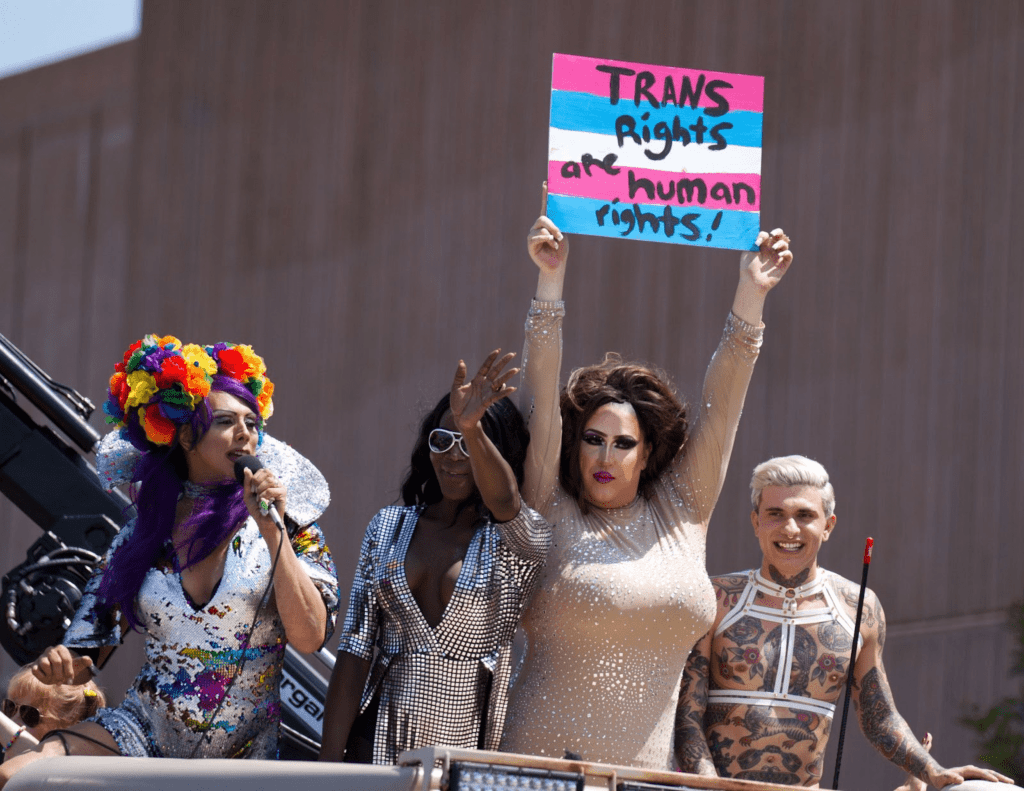We like to cover lots of light and fun topics on our blog. You can read about lesbian tv shows, trans books, how queer people feel about astrology, and more.
But, sometimes, we’ve got to get serious and talk about the very real issues facing our community. If you’ve been paying any attention at all, you know that trans rights are at stake and under attack.
Trans people have always struggled for equality and acceptance. But these days, they’re being actively targeted by bigots and politicians. And we need to talk about it.
Trans rights are human rights
Trans people are people. They deserve the right not to be discriminated against, to be treated fairly by court, freedom of opinion and expression, and more — just like everyone else. But for many of our trans siblings, that’s not reality.
Trans people are discriminated against in employment, housing, sports, medical care, and public places — especially restrooms.
Trans rights in the US
Politicians like to claim that trans people are a threat, but we know better. Just about any queer person will tell you they’d feel much safer having their kids around a trans person than one of the greedy politicians who use queer issues like political footballs.
Terrifying fact: A trans hacker exposed American congresspeople’s emails all about trans issues. The leaked emails reveal that these politicians don’t even believe the rhetoric they use against trans people. They’re whipping up false narratives, fear mongering for votes, plain and simple. It has nothing to do with safety, morals, or so-called “family values.”
According to the HRC (Human Rights Campaign), 340 anti-LGBTQIA+ bills have been introduced in state houses across the US, in 2023. It’s only March. And as many as 150 of those laws restrict the rights of trans people. This record-breaking number represents the largest legislative attack on the trans community to date.
Along with a rash of anti-trans bathroom bills, trans youth are being specifically targeted in 90 bills that go after “age-appropriate” gender-affirming care. Utah and South Dakota have already signed two of these bills into law.
And let’s not forget about the bills to ban trans kids from sports. In the past 3 years, 19 states have passed these discriminatory laws.
In 2022, state houses brought forward 149 anti-trans bills, 17 of which were signed into law. One would’ve been too many.
The fight for trans rights in the US
Yes, there’s gloom and doom on the trans rights front in the US. But that doesn’t mean we need to back off and take it! Come on queers and allies, let’s do our thing. If we band together to raise awareness and make some noise, we can fight this anti-trans hate. If you’re ready to make a difference for our trans community in the US, here are some things you can do:
✅ Join local activist groups and participate in events in your community. There’s strength in numbers. And if we listen to the local organizers who have been in the fight, we can make important political changes close to home.
✅ Make financial contributions to trans rights organizations like the HRC and the ACLU (American Civil Liberties Union) — and so many more — who are on the front lines fighting these discriminatory laws.
✅ Stand up for trans people out in the wild. If you see or hear an anti-trans bigot, speak up! Don’t let those Karens off the hook.
✅ Give trans people the microphone. Share links to their content, boost their social media posts, and suggest them as speakers for anti-trans events. These laws dehumanize trans folks. But since hate and compassion can’t co-exist, even an anti-trans bigot might think twice once they have a human connection with a trans person. There are generous trans people who are speaking up and speaking out. And we can boost their platforms and help make their voices heard.
Trans rights in Iran
Trans people around the world are fighting for visibility, dignity, safety, and the right to exist. Let’s take a look at Iran. Trans rights in Iran are more complicated than you might think.
In Iran, gay men face the death penalty, and lesbians face floggings — which can eventually become death penalties after enough “offences.”
But trans people are legally recognized, and can even get funding for gender-affirming surgery. It all started back in 1979 when an incredibly brave trans woman named Maryam Khatoonpour Molkara made history. She managed to push past the guards and get the attention of Ayatollah Ruhollah Khomeini, he Shiite theocracy’s founder.
Dressed as a man, Maryam pleaded her case and explained that her true gender was different from her physical sex. She persuaded the leader to help her. And Khomeini issued a groundbreaking fatwa (religious decree) that called for respect of transgender people and sanctioned gender-transition surgery.
This isn’t quite as progressive as it sounds. The ruling clerics believe gender reassignment surgery is the cure to a “disease.” Surgery — and a change in paperwork — puts trans people back into the strict gender binary. If a trans person doesn’t have surgery and get new papers, they can be arrested for dressing outside of their government-recognized gender.
Just because they have the opportunity for gender reassignment doesn’t mean trans people in Iran have it easy. Societal norms haven’t caught up with the progressive government policy. Trans people are deeply misunderstood by society as a whole. In fact, they face verbal abuse, harassment, and even physical attacks.
And things aren’t often much better at home. Because of long-standing prejudices, trans people in Iran face anti-trans bigotry from family as well. Often families will do everything in their power to prevent their trans relative from going through with their gender reassignment surgery. They’ll try to silence their trans children and even relocate their family.
Trans women are often threatened or kicked out of their homes with nowhere to go.
Trans rights in Pakistan
In 2018, the Transgender Persons (Protection of Rights) Act was passed. This law opened the door for trans people to have their true gender identity recognized on driver’s licenses, national IDs, and other official documents. The bill also prohibited discrimination in schools, at work, on public transit, and when receiving medical care.
This law guaranteed trans people in Pakistan retained the right to vote or run for office. This act even addressed their rights to inheritance — which are based on gender. And it mandated the establishment of “Protection Centers and Safe Houses,” for trans people.
When this law was passed, trans people in Pakistan were allowed the right to choose their gender identity based on their own self-perception.
But all that changed just a few weeks ago. On February 13th, Pakistan’s Senate Standing Committee on Human Rights on Monday proposed and passed an amendment to the 2018 law, stripping away protections from the vast majority of trans people. The change to the law replaced the word “transgender” with “Khunsa”. A Khunsa refers specifically to someone with both male and female genital features or congenital ambiguities.
Senator Walid Iqbal pushed this change by claiming that gender is solely based on physical appearance, genital attributes, and congenital ambiguities, rather than an inner knowing.
The changes in this law also carry some additional financial implications. Inheritance laws in Pakistan are gender-specific. And this amendment affects how trans people stand to inherit wealth from their families.
It’s a tough time for the trans community in Pakistan. The reversal of these legal protections just adds to the challenges trans people face on a daily basis. Discrimination and violence are common. Trans people are often abandoned by their families, facing harassment and death threats. It’s not uncommon for trans women to rely on begging and sex work to support themselves. And they are vulnerable to violent crimes, with at least 38 trans people killed in Pakistan in 2022.
Trans people need our support
Our trans siblings are suffering around the world. Trans people have gained more visibility in society, books, music, film, and tv. But many countries have been turning up the volume on persecution and anti-trans legislation.
Trans rights are human rights. And we all have a role to play in creating a more just and equitable world. As individuals, we can educate ourselves on how to support the trans community and challenge our own biases. We can support trans-led organizations and advocate for policies that protect trans people. And we can use our own platforms and privilege to amplify the voices of trans folks. It’s up to us to create and support safe spaces for trans people to share their stories and experiences. By working together, we can build a more inclusive and affirming world for all the members of the LGBTQIA+ community.







